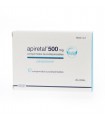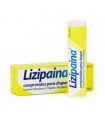Lizifen contains flurbiprofen. Flurbiprofen belongs to a group of medicines called nonsteroidal anti-inflammatory drugs (INEs).
These medications work by modifying your body's response to pain, swelling, and fever. Lizifen is used for short-term relief of sore throat symptoms such as pain, difficulty swallowing and throat inflammation in adults and children 12 years and older.
You should see a doctor if it gets worse or if it does not improve after 3 days of treatment.
ACTION AND MECHANISM
Non-steroidal anti-inflammatory (NSAID) belonging to the arilpropionic group, which works by preventing the synthesis of prostaglandins, by competitive and reversible inhibition of cyclooxygenase activity, an enzyme that converts arachydonic acid into prostaglandins.
Elderly
The elderly are at increased risk of serious consequences for adverse reactions. If INE administration is deemed necessary, the minimum effective dose should be administered for the minimum time necessary. The patient should be regularly monitored for gastrointestinal bleeding during treatment.
Contraindications
- Known hypersensitivity to flurbiprofen or [INE ALLERGY].
- Patients with a history of hypersensitivity to acetylsalic acid or other NSAIDs, including patients who have experienced asthma seizures, acute rhinitis, hives or angioneurotic oedema after using acetylsalic acid or other NSAIDs.
- [DIGESTIVE HEMORRAGIA], [PEPTICA ULCER] active.
- Severe renal failure (ClCr < 30 ml/min).
- Severe hepatic impairment (Child-Pugh class C).
- [CARDIAC INSUFFICIENCY] severe.
- Third trimester of pregnancy.
Pregnancy
FDA Category B, fda 3rd trimester category D. There are no adequate and well-controlled studies in humans. Occasional use, except shortly before delivery, does not appear to cause foetal side effects. However, with chronic use during the 3rd trimester, they could theoretically produce premature closure of the fetus' arterious ductus, by inhibiting the synthesis of prostaglandins. They can also produce antiplatelet effect, which could complicate or prolong maternal bleeding and predispose the newborn. Before delivery, they can reduce and even cancel uterine contractility, delaying childbirth and prolonging gestation. The use of these drugs, especially during the third trimester, is only accepted in case of absence of safer therapeutic alternatives.
Indications
- Short-term symptomatic relief from [GARGANTA PAIN].
Interactions
- NSAIDs, including anti-aggregating doses of acetylsalylic acid. Increases the risk of peptic ulcer and gastric bleeding.
-Aliskiren. Possible reduction of the antihypertensive effect of aliskiren (NSAIDs act on the renin-angiotensin system). In patients with compromised renal function (dehydrated or elderly) impaired renal function (possible acute renal failure, usually reversible) may be precipitated. Caution, especially in the elderly, monitoring the antihypertensive effect and renal function.
- SSRS antidepressants (fluoxetine, paroxetine, sertraline, citalopram). There is an increased risk of bleeding in general, and gastrointestinal in particular, especially in the elderly and patients with a history of digestive bleeding.
- Diuretics. Fflurbiprofen could oppose diuretic and antihypertensive effects. Regular blood pressure evaluation is recommended.
- Glitazones (pioglitazone, rosiglitazone). Theoretical risk of edema empowerment that both glitazones and NSAIDs can cause. Caution and monitor possible signs of fluid retention and heart failure (swollen ankles, dyspnoea).
- Antiplatelet agents, including pentoxyphline: there is an increased risk of bleeding in general, and gastrointestinal in particular. Administer with caution.
- Potassium supplements: possible increase in potassium levels, with risk of hyperkalemia.
Breast feeding
Concentrations of flurbiprofen have been detected in milk below 0.7% of maternal serums. It is highly unlikely that excreted cantide will have a negative impact on the infant. However, caution is recommended when using in nursing mothers.
Children
This medicine is indicated in adults and children 12 years of age or older.
RULES FOR PROPER ADMINISTRATION
- Tablets and pills to suck: suck slowly in the mouth. To avoid local irritation, it should be kept moving while dissolved.
Dosage
"Compressed posology to suck"
- Adults and adolescents from 12 years: 1 pill/3-6 h, up to a maximum of 5 pills/24 h.
- Children < 12 years: not recommended or contraindicated.
- Elderly: clinical experience is very limited, and does not allow specific dosage recommendations to be established.
Duration of treatment: maximum 3 days.
POSOLOGY IN HEPATIC IMPAIRMENT
- Mild to moderate hepatic impairment (Child-Pugh classes A and B): no dose readjustment required.
- Severe hepatic impairment (Child-Pugh class C): contraindicated.
POSOLOGY IN RENAL INSUFFICIENCY
- Mild to moderate renal impairment (ClCr 30-90 ml/min): no dose adjustment required.
- Severe renal impairment (ClCr < 30 ml/min): contraindicated.
Precautions
- [RENAL INSUFFICIENCY]. Contraindicated use in severe renal impairment. NSAIDs could result in decreased renal blood flow with reversible acute renal impairment due to inhibition of vasodilating prostaglandin synthesis, and cases of nephrotic syndrome and acute interstitial nephritis have even been reported with prolonged treatments. Patients at increased risk of renal failure are those with prior renal impairment, the elderly or situations that could reduce renal flow, such as [HIPOVOLEMIA], [DEHYDRATION], hyposodic diets, [CARDIAC INSUFFICIENCY], hepatic impairment, [CIRROSIS HEPATICA] or treatment with diuretics, IECA or ARAII. In high-risk patients, during prolonged treatments, it is recommended to determine renal functionality (serum creatinine, CLcr) before starting treatment, and periodically. In case of worsening renal functionality, a dose reduction may be necessary.
- [HEPATIC INSUFFICIENCY]. Use in severe insufficiency is contraindicated.
- Gastrointestinal toxicity. Treatment with NSAIDs has resulted in gastroduodenal ulcers, as well as life-threatening bleeding and perforation. There is an increased risk of ulceration with high-dose or long-term treatments, with a history of peptic ulceration, especially if they have already had bleeding or gastrointestinal perforation by NSAIDs, as well as in [TABAQUISMO], [CRONICO ALCOHOLISM] or elderly or weakened patients. However, short-term treatment is also not without risks.
As a general rule to reduce gastric damage, it is advised to administer any NSAIDs with food. In addition, in risk groups it is advisable to start treatment with the minimum possible dose, and associate whenever possible an antiulcer drug (H2 or PPI).
Patients at high risk, as well as those receiving drugs that may promote or aggravate gastrointestinal bleeding, such as oral anticoagulants, antiplatelets, corticosteroids or SSRS, should be closely monitored. If a peptic ulcer or gastrointestinal bleeding occurs, treatment will be discontinued. On the other hand, it should be used with caution in people with [INTESTINAL INFLAMMATORY DISEASE], where NSAIDs could precipitate a crisis.
- Cardiovascular diseases. NSAIDs could lead to fluid retention and edema, which could increase blood pressure and worsen symptomatology in patients with cardiovascular disease. It is recommended to individually evaluate the benefit/risk ratio in patients with [ARTERIAL HYPERTENSION], [CARDIAC INSUFFICIENCY], [CARDIOPATIA ISQUEMICA], [CEREBRAL ISQUEMIA], [ICTUS] or [ARTERIOPATIA PERIFERICA], as well as in patients with cardiovascular risk factors, such as [DISLIPEMIA], [DIABETES] or [TABAQUISM]. NSAIDs should always be used at the minimum effective dose and for the shortest period of time.
- Liver effects. Patients with [HEPATICA INSUFFICIENCY] may see their plasma levels increased. In addition, due to its high plasma protein binding, its free plasma levels may be increased, as has been proven in case of [CIRROSIS HEPATICA].
On the other hand, the use of NSAIDs has sometimes been linked to the onset of liver tables, such as increased transaminase, [ICTERICIA] and [HEPATITIS], which could become serious and even fatal. Due to the risk of toxicity it is advised that patients with liver disease use this medicine at the minimum effective dose, and periodically review liver functionality (transaminases, bilirubin) for any signs of liver damage. Its use is contraindicated in severe hepatic impairment (Child-Pugh Class C) as it has no data on its safety.
- Skin reactions. The use of NSAIDs has caused very rare but life-threatening serious adverse reactions, such as exfoliative dermatitis, toxic epidermal necrolysis or Stevens-Johnson syndrome. These adverse reactions are usually early onset in the first month of treatment. If symptoms of hypersensitivity, mucous lesions or skin erythema are found, treatment will be discontinued.
- [HYPERSENSITIVITY REACTIONS]. Administration of any NSAIDs has been linked to the occurrence of allergic reactions. Cases of cross hypersensitivity between different NSAIDs, as well as between NSAIDs and salicylates, have been reported, so patients with a history of [EDID ALLERGY] other than this active substance or [SALICILATOS ALLERGY] should use this active substance with extreme caution.
It is recommended to avoid use in patients where salicylate or NSAIDs have previously resulted in severe allergic reactions, including [ASMA], [POLIPOS NASALES], [ANGIOEDEMA] or [RINITIS], because there is an increased risk of life-threatening anaphylaxis.
- [ASMA]. Asthmatic patients are more likely to experience bronchospasm in case of administration of an NSAID. They may also be more susceptible to anaphylactic pictures following administration of an NSAID.
- [COAGULATION ALTERATIONS]. NSAIDs have antiplatelet activity, although lower than that of aspirin.
- [MENINGITIS ASEPTICA]. Rare cases of aseptic meningitis have been reported in patients with NSAIDs, with fever and coma, probably due to a hypersensitivity reaction, although no cross-allergy has been found among NSAIDs. This meningitis appears to be more common in patients with [COLAGENOSIS] such as [LUPUS ERITEMATOSO SISTEMICO], although it has also been reported in some patients who did not have these pathologies. In patients treated with NSAIDs who develop symptoms of meningitis, the possibility of aseptic meningitis should be considered.
- Ophthalmological tables. NSAIDs have been linked to eye reactions, such as blurred vision, vision loss, color vision disturbance, broom, or retinal disturbances.
- [FEMALE INFERTILITY]: Like other NSAIDs, it may decrease female fertility and is not recommended for use in women who wish to become pregnant. In women who have difficulty conceiving or studying for infertility, withdrawal of NSAIDs should be considered.
EXCIPIENT PRECAUTIONS
- This medicine contains glucose. Patients with glucose or galctose malaabsorption should not take this medicine.
ADVERSE REACTIONS
The following adverse reactions are related to the use of short-term flurbiprofen at over-the-counter doses.
- Blood: (<0.1%): [ANAEMIA]. (<0.01%): haematopoietic alterations, ([HEMOLITICA ANAEMIA], [APLASIC ANAEMIA], [NEUTROPENIA], [TROMBOCITOPENIA], [AGRANULOCYTOSIS]). The first signs are: fever, sore throat, superficial mouth ulcers, flu symptoms, severe tiredness, bruising and unexplained bleeding.
- Nervous system: (<1%): [CEFALEA] and [MAREO]. (0.1-0.01%): [INSOMNIA]
- Respiratory: (0.1-0.01%): [DISAGGA]. Exacerbation of [ASMA] and [BRONQUIAL SPASM].
- Gastrointestinal: (>10%): Oral discomfort (feeling burning or itching in the mouth). (1-10%): [ABDOMINAL PAIN], [DIARREA], [MOUTH DRYNESS], [BUCAL ULCER], [NAUSEAS] and oral partesia. (<1%): [DISPEPSIA], [FLATULENCE] and vomiting. (0.1-0.01%): [GASTRIC PERFORATION] and [GASTRIC ULCERA] or [DUODENAL ULCER].
- Renal and urinary: (<0.1%): [INTERSTITIAL NEPHRITIS],[NEFROTICO SINDROME] and renal failure.
Overdose
- Symptoms: syntomatology by overdose is unknown, similar drugs have produced gastrointestinal alterations (vomiting, anorexia, abdominal pain), neurological (sleepiness, vertigo, disorientation, headache).
- Measures to be taken: Aspiration and gastric lavage, administration of adsorbent carbon, alkalinization of urine, monitoring and maintenance of vital signs, symptomatic treatment of gastrointestinal irritation, hypotension, respiratory depression and seizures, with monitoring of renal and hepatic functions and detection in faeces of possible gastrointestinal bleeding.































